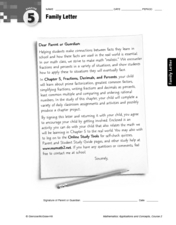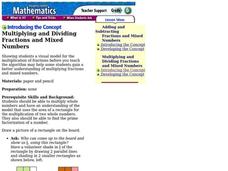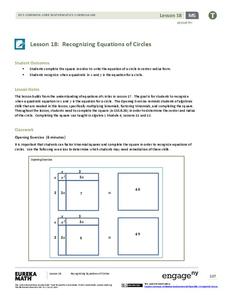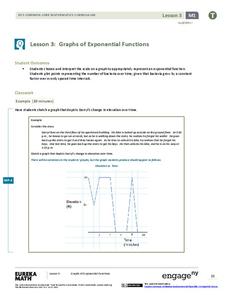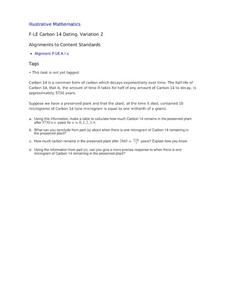Curated OER
Family Activity - Color by Numbers: Fractions, Decimals, and Percents
Learners solve four short answer problems. They determine the number of each color of candy or paper clip in a bag, and calculate the fractional, decimal, and percentage representation of the color compared to the total number of items.
Curated OER
Multiplying and Dividing Fractions and Mixed Numbers
Help math learners discover how to multiply fractions and mixed numbers. They will explore visual examples of the operations. They also practice solving problems that their instructor models.
Curated OER
Multiplying and Dividing Fractions and Mixed Numbers
Upper graders study fraction and mixed number division and also review fraction multiplication. For this fraction and mixed numbers lesson, learners work with the teacher in an oral problem solving method to multiply and divide fractions...
Curated OER
Rewrite by Factoring
For this factoring worksheet, 7th graders solve and complete 20 different problems that include rewriting the expression. They rewrite each expression shown by factoring. Students determine the common factors in each of its terms. Then,...
Curated OER
Multiply Rational Expressions
In this algebra worksheet, students solve rational expressions using multiplication. They cancel out common factors and simplify the expression. There are 28 questions with an answer key.
Curated OER
Reducing Ratios
In this reducing ratios worksheet, students reduce or simplify 8 ratio expressions by finding common factors for the two numbers.
EngageNY
Polynomial, Rational, and Radical Relationships
This assessment pair goes way beyond simple graphing, factoring and solving polynomial equations, really forcing learners to investigate the math ideas behind the calculations. Short and to-the-point questions build on one another,...
EngageNY
Mastering Factoring
Math class is full of drama—there are so many problems to work out! Pupils work out factoring problems. They use quadratic methods of factoring higher degree polynomials, in addition to factoring the sum and difference of two...
EngageNY
Obstacles Resolved—A Surprising Result
The greater the degree, the more solutions to find! Individuals find the real solutions from a graph and use the Fundamental Theorem of Algebra to find the remaining factors.
EngageNY
Putting It All Together
Shuffle 'em up and deal! Learners practice operations with polynomials using cards they pass around the room. The activity works with pairs or individuals, so it offers great flexibility. This is the fifth installment in a series of 42...
EngageNY
Four Interesting Transformations of Functions (Part 3)
Continue the study of transformations with an examination of horizontal stretches, shrinks, and reflections. Individuals use the same process used in parts one and two of this series to examine horizontal changes. The resource also...
EngageNY
Recognizing Equations of Circles
What does completing the square have to do with circles? Math pupils use completing the square and other algebraic techniques to rewrite equations of circles in center-radius form. They then analyze equations of the form x^2 + y^2 + Ax +...
EngageNY
The Remainder Theorem
Time to put it all together! Building on the concepts learned in the previous lessons in this series, learners apply the Remainder Theorem to finding zeros of a polynomial function. They graph from a function and write a function from...
EngageNY
Matrix Multiplication and Addition
To commute or not to commute, that is the question. The 26th segment in a 32-segment lesson focuses on the effect of performing one transformation after another one. The pupils develop the procedure in order to multiply two 2 X 2...
Noyce Foundation
Baseball Players
Baseball is all about statistics. Pupils solve problems related to mean, median, and range. They calculate the total weight of players given the mean weight, calculate the mean weight of reserve players given the mean weight of the...
Illustrative Mathematics
Calculator Trouble
When is not solving the expression the correct answer? When you are checking the understanding of a math concept that is not number dependent. The real question being asked here is to look at the initial number, fraction, mixed number,...
EngageNY
Graphs of Exponential Functions
What does an exponential pattern look like in real life? After viewing a video of the population growth of bacteria, learners use the real-life scenario to collect data and graph the result. Their conclusion should be a new type of...
West Contra Costa Unified School District
Derivation of the Quadratic Formula
What connection does the quadratic formula have with a quadratic equation? Using a matching activity, pupils construct the algebraic derivation of the quadratic formula in this Algebra II lesson task. The task provides two variations of...
EngageNY
The Zero Product Property
Zero in on your pupils' understanding of solving quadratic equations. Spend time developing the purpose of the zero product property so that young mathematicians understand why the equations should be set equal to zero and how that...
EngageNY
Exploiting the Connection to Cartesian Coordinates
Multiplication in polar form is nice and neat—that is not the case for coordinate representation. Multiplication by a complex number results in a dilation and a rotation in the plane. The formulas to show the dilation and rotation are...
Mathematics Assessment Project
Representing Quadratic Functions Graphically
Sometimes being different is an advantage. An engaging activity has scholars match cards with quadratic functions in various forms. Along the way, they learn about how each form highlights key features of quadratic functions.
Curated OER
Carbon 14 Dating, Variation 2
Your archaeologists begin this task with a table of values to estimate the time passed based on the half-life of Carbon 14 remaining in a plant. They then move on to find when a specific amount of Carbon 14 is present in the same plant,...
Curated OER
Profit of a Company
Your business executives choose which of three equivalent forms of a quadratic equation is the most useful for finding various pieces of information in this task centered on a company's profits.
Visa
Cars and Loans
What's the best way to pay for a car? Should I buy used or new? Can I realistically afford a car? Pupils discover the ins and outs of buying a car, from how to shop for car insurance to the advantages and...


